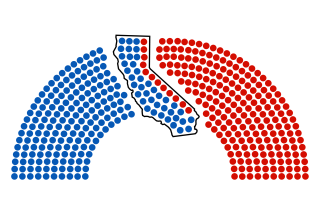California GOP sinking into third-party status
SACRAMENTO — Another Republican politician has bolted the GOP, protesting that the party is too rigid.
In fact, both major parties — all partisan politics — have become too strident and stifling, he says.
So Bruce McPherson, 68 — former California secretary of state and centrist legislator and current candidate for the Santa Cruz County Board of Supervisors — has re-registered as an independent, or “no party preference.”
In doing that, McPherson is fitting into the pattern of millions of Californians who have snubbed the parties and become nonpartisans.
More than one-fifth of registered voters, 21.3%, are listed with no party preference, according to the Secretary of State. That’s double the 10.7% in 1996 and more than quadruple the 5% in 1972.
In the last 16 years, the GOP’s slice of the electorate has fallen from 37% to 30.2%. The Democrats’ share also has declined, but less precipitously — from 47.1% to 43.4%.
“I walk precincts door to door and people tell me they’re looking for an independent voice,” McPherson says. “They see partisan politics as paralyzing the governing process. They see no movement or communication. They’re frustrated and fed up.
“But I’m not going to do Republican bashing because the left wing of the Democratic Party is guilty of the same thing. It’s ‘my way or the byway.’ Republicans want to shut down things and Democrats want to pay for everything.
“There’s no middle.”
McPherson is following the lead of other former Republicans who recently deserted the GOP to become independents, including Assemblyman Nathan Fletcher of San Diego and Ventura County Supervisor Linda Parks.
Fletcher was running for mayor and Parks for Congress. Fletcher improved his position by shedding the GOP, polls showed. But both he and Parks finished third and out of the November runoffs.
“Nathan certainly proved that there is a growing segment of the voters who will support independent candidates,” says Fletcher’s campaign manager, Matt David, who was former Gov. Arnold Schwarzenegger’s communications director.
Republican attacks on Fletcher after his defection actually increased the candidate’s voter appeal, David says. But he was hurt by the subsequent lack of party fundraising and volunteer help.
It’s impossible to assess any grand, overarching meaning in all this — except that in each case the politician felt that the Republican label was an albatross. The candidates’ actions may have been self-serving, but it’s an ugly mark on the GOP that they felt better served not being burdened by the party.
“If the Republican Party doesn’t right its ship, there’ll be increasing numbers of candidates who determine they’re better off being a no-party candidate,” says Republican consultant Richard Temple, a former McPherson campaign manager. “Politics is about survival and victory.”
On the other hand, Temple adds, “switching and losing doesn’t inspire a lot of people. The trend will continue if someone does it and wins.”
That’s likely to be the amiable McPherson, but his case may not prove much. He probably didn’t agonize a lot before cutting loose from the GOP.
Santa Cruz County has the fourth-highest Democratic registration percentage in the state, 54%. McPherson’s supervisorial district is 48% Democratic, with slightly more independents, 23%, than Republicans, 22%.
Moreover, local government offices are supposed to be nonpartisan.
McPherson apparently fell a few dozen votes short of winning the election outright in the primary. He needed to exceed 50%. It’s looking like a November runoff against a first-time Democratic candidate, businessman Eric Hammer.
McPherson’s abandonment of the GOP immediately picked up the campaign support of Santa Cruz county Treasurer Fred Keeley, a liberal Democrat and former fellow legislator.
“Bruce should have done this years ago,” Keeley says. “The Republican Party left him a long time ago. He’s an old-school Republican, but the party wandered off on social issues. He’s not a social bigot.”
That’s not just the view of a Democratic lib.
“In California, the Republican Party has done tremendous damage to its brand with its positions on immigration and gay marriage,” David says. “Add to that the no-tax pledge.
“You can be fundamentally opposed to a tax increase, but to sign a pledge never to vote for a tax doesn’t allow you to have honest negotiations with the other side.”
The GOP consultant adds, “A Republican committed to public service who wants to serve the state in an elected capacity is absolutely going to have to consider running as an independent, given the damage done to the Republican brand.”
During 11 years in both legislative houses, McPherson was a fiscal conservative; he can’t remember ever voting for a tax hike, but neither did he sign any pledge.
He was a strong supporter of public education and a social moderate, favoring abortion rights, gun control and environmental protection. He also was a spotless good-government guy.
When Schwarzenegger appointed him secretary of state in 2005 to replace Democrat Kevin Shelley, who resigned amid scandal, the Legislature confirmed him without a whimper.
But illustrating the difficulty of a Republican being elected to statewide office, McPherson was narrowly beaten by Democrat Debra Bowen the next year. He also once ran for lieutenant governor and lost to Democrat Cruz Bustamante.
McPherson is considered, however, the only Republican who could get elected in Santa Cruz County, the epitome of the “left coast.”
He’s exactly the type of politician with broad appeal that Republicans should not only be retaining but recruiting.
Instead, his departure highlights a decaying, ineffective party in California — and a dysfunctional, partisan governing system nationally.
The GOP already is a “third party” in McPherson’s supervisorial district. And it’s headed in the same direction statewide.
More to Read
Start your day right
Sign up for Essential California for news, features and recommendations from the L.A. Times and beyond in your inbox six days a week.
You may occasionally receive promotional content from the Los Angeles Times.







